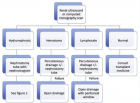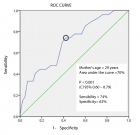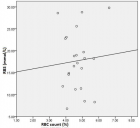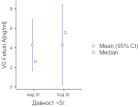Abstract
Research Article
Association of Cytokine Gene Polymorphisms with Inflammatory Responses and Sepsis Outcomes in Surgical and Trauma Patients
Amália Cinthia Meneses do Rêgo and Irami Araújo-Filho
Published: 19 February, 2024 | Volume 8 - Issue 1 | Pages: 004-008
Sepsis, a life-threatening condition triggered by infection, poses a significant healthcare challenge with high mortality rates. The interplay between genetics and the immune response in sepsis, particularly in surgical and trauma patients, is complex and critical. Genetic polymorphisms, particularly in cytokine genes like TNF-α, IL-6, and IL-8, have been extensively studied for their influence on sepsis susceptibility, severity, and outcomes. Polymorphisms can alter gene expression and cytokine production, leading to variations in immune responses. Studies have also explored polymorphisms concerning sepsis in genes encoding CD86, TLR4, and SIRT6. This review highlights the association between genetic polymorphisms and inflammatory responses, focusing on their impact on sepsis outcomes in surgical and trauma patients. Genetic variations play a significant role in sepsis risk, severity, and prognosis, with potential implications for personalized therapeutic strategies. Biomarkers such as cytokine gene polymorphisms may aid in predicting sepsis risk and guiding treatment decisions. Complementary therapies like acupuncture and novel biomarkers like microvesicles carrying mitochondrial content provide additional avenues for personalized sepsis management. Furthermore, multiomics approaches offer promise in predicting postoperative outcomes in surgical patients. Understanding the genetic basis of sepsis is essential for improving prevention, diagnosis, and treatment, ultimately leading to better clinical outcomes. Combining genomics, bioinformatics, and clinical expertise, precision medicine can revolutionize sepsis management by tailoring interventions to individual genetic profiles, thus enhancing patient care and outcomes.
Read Full Article HTML DOI: 10.29328/journal.ascr.1001076 Cite this Article Read Full Article PDF
Keywords:
Operative surgical procedures; Postoperative period; Systemic inflammatory response syndrome; Sepsis; Genetic polymorphism; Prognostic factors
References
- Baghel K, Srivastava RN, Chandra A, Goel SK, Agrawal J, Kazmi HR, Raj S. TNF-α, IL-6, and IL-8 cytokines and their association with TNF-α-308 G/A polymorphism and postoperative sepsis. J Gastrointest Surg. 2014 Aug;18(8):1486-94. doi: 10.1007/s11605-014-2574-5. Epub 2014 Jun 19. PMID: 24944154.
- Feng B, Mao ZR, Pang K, Zhang SL, Li L. Association of tumor necrosis factor α -308G/A and interleukin-6 -174G/C gene polymorphism with pneumonia-induced sepsis. J Crit Care. 2015 Oct;30(5):920-3. doi: 10.1016/j.jcrc.2015.04.123. Epub 2015 May 9. PMID: 26025100.
- Cao L, Li Z, Ren Y, Wang M, Yang Z, Zhang W, Han X, Yao M, Sun Z, Nie S. Xuebijing Protects Against Septic Acute Liver Injury Based on Regulation of GSK-3β Pathway. Front Pharmacol. 2021 Apr 30;12:627716. doi: 10.3389/fphar.2021.627716. PMID: 33995024; PMCID: PMC8120308.
- Georgescu AM, Banescu C, Azamfirei R, Hutanu A, Moldovan V, Badea I, Voidazan S, Dobreanu M, Chirtes IR, Azamfirei L. Evaluation of TNF-α genetic polymorphisms as predictors for sepsis susceptibility and progression. BMC Infect Dis. 2020 Mar 14;20(1):221. doi: 10.1186/s12879-020-4910-6. PMID: 32171247; PMCID: PMC7071754.
- Zou X, Cai J, Li B, Wu S. Genetic association between cluster of differentiation 86 variations and sepsis risk: A case-control study. Medicine (Baltimore). 2019 Oct;98(43):e17482. doi: 10.1097/MD.0000000000017482. PMID: 31651850; PMCID: PMC6824797.
- Fu P, Xie S, Zhang X. IL-8 gene locus is associated with risk, severity, and 28-day mortality of sepsis in a Chinese population. Clin Exp Med. 2019 Nov; 19(4):571-576. doi: 10.1007/s10238-019-00584-5.
- Sharma R, Agrawal S, Saxena A, Sharma RK. Association of IL-6, IL-10, and TNF-α gene polymorphism with malnutrition inflammation syndrome and survival among end stage renal disease patients. J Interferon Cytokine Res. 2013 Jul;33(7):384-91. doi: 10.1089/jir.2012.0109. Epub 2013 Jun 18. PMID: 23777202.
- Majetschak M, Obertacke U, Schade FU, Bardenheuer M, Voggenreiter G, Bloemeke B, Heesen M. Tumor necrosis factor gene polymorphisms, leukocyte function, and sepsis susceptibility in blunt trauma patients. Clin Diagn Lab Immunol. 2002 Nov;9(6):1205-11. doi: 10.1128/cdli.9.6.1205-1211.2002. PMID: 12414751; PMCID: PMC130126.
- Majetschak M, Flohé S, Obertacke U, Schröder J, Staubach K, Nast-Kolb D, Schade FU, Stüber F. Relation of a TNF gene polymorphism to severe sepsis in trauma patients. Ann Surg. 1999 Aug;230(2):207-14. doi: 10.1097/00000658-199908000-00011. PMID: 10450735; PMCID: PMC1420863.
- Wang L, Zhao H, Wang D. Inflammatory cytokine expression in patients with sepsis at an intensive care unit. Exp Ther Med. 2018 Sep;16(3):2126-2131. doi: 10.3892/etm.2018.6376. Epub 2018 Jun 29. PMID: 30186449; PMCID: PMC6122406.
- Li X, Yan B. Research on the effect of cytokine concentration on the immune level and survival conditions of elderly patients with sepsis. Exp Ther Med. 2018 Aug;16(2):842-846. doi: 10.3892/etm.2018.6221. Epub 2018 May 24. PMID: 30112039; PMCID: PMC6090424.
- He J, Zhang Q, Zhang W. The interleukin-27 -964A>G polymorphism enhances sepsis-induced inflammatory responses and confers susceptibility to the development of sepsis. Crit Care. 2018 Sep 30; 22(1):248. doi: 10.1186/s13054-018-2180-0.
- Fatani SH, Alkhatib KH, Badr H, ALrefai AA. Association of TNF-α-308 (G >A) (rs1800629)Gene Polymorphism with Adverse Outcomes of Sepsis in Critically Ill Patients. DNA Cell Biol. 2020 Sep;39(9):1723-1729. doi: 10.1089/dna.2020.5468. Epub 2020 Jul 17. PMID: 32700971.
- Hugo Montes A, Valle-Garay E, Martin G, Collazos J, Alvarez V, Meana A, Pérez-Is L, Carton JA, Taboada F, Asensi V. The TNF-α(-238 G/A) polymorphism could protect against development of severe sepsis. Innate Immun. 2021 Jul;27(5):409-420. doi: 10.1177/17534259211036186. PMID: 34472396; PMCID: PMC8419297.
- Yang L, Zhou D, Cao J, Shi F, Zeng J, Zhang S, Yan G, Chen Z, Chen B, Guo Y, Lin X. Revealing the biological mechanism of acupuncture in alleviating excessive inflammatory responses and organ damage in sepsis: a systematic review. Front Immunol. 2023 Sep 11;14:1242640. doi: 10.3389/fimmu.2023.1242640. PMID: 37753078; PMCID: PMC10518388.
- Zhang HJ, Li JY, Wang C, Zhong GQ. Microvesicles with mitochondrial content are increased in patients with sepsis and associated with inflammatory responses. World J Clin Cases. 2023 Jan 16;11(2):342-356. doi: 10.12998/wjcc.v11.i2.342. PMID: 36686348; PMCID: PMC9850980.
- Verdonk F, Einhaus J, Tsai AS, Hedou J, Choisy B, Gaudilliere D, Kin C, Aghaeepour N, Angst MS, Gaudilliere B. Measuring the human immune response to surgery: multiomics for the prediction of postoperative outcomes. Curr Opin Crit Care. 2021 Dec 1;27(6):717-725. doi: 10.1097/MCC.0000000000000883. PMID: 34545029; PMCID: PMC8585713.
- Dong GH, Gong JP, Li JZ, Luo YH, Li ZD, Li PZ, He K. Association between gene polymorphisms of IRAK-M and the susceptibility of sepsis. Inflammation. 2013 Oct;36(5):1087-93. doi: 10.1007/s10753-013-9641-z. PMID: 23588345.
- Lee K, Chang Y, Song K, Park YY, Huh JW, Hong SB, Lim CM, Koh Y. Associations between Single Nucleotide Polymorphisms of High Mobility Group Box 1 Protein and Clinical Outcomes in Korean Sepsis Patients. Yonsei Med J. 2016 Jan;57(1):111-7. doi: 10.3349/ymj.2016.57.1.111. PMID: 26632390; PMCID: PMC4696941.
- Ahmed Ali M, Mikhael ES, Abdelkader A, Mansour L, El Essawy R, El Sayed R, Eladawy A, Mukhtar A. Interleukin-17 as a predictor of sepsis in polytrauma patients: a prospective cohort study. Eur J Trauma Emerg Surg. 2018 Aug;44(4):621-626. doi: 10.1007/s00068-017-0841-3. Epub 2017 Sep 15. PMID: 28916848.
- McDaniel DO, Hamilton J, Brock M, May W, Calcote L, Tee LY, Vick L, Newman DB, Vick K, Harrison S, Timberlake G, Toevs C. Molecular analysis of inflammatory markers in trauma patients at risk of postinjury complications. J Trauma. 2007 Jul;63(1):147-57; discussion 157-8. doi: 10.1097/TA.0b013e31806bf0ab. PMID: 17622883.
- Azeez OM, Amid SA, Abdulkadir ZS, Biobaku KT. Maintenance Impact of Large Dose of Vitamin C on Proinflammatory Cytokines, Insulin, and Electrocardiographic Parameters of Wistar Rats Following Partial Pancreatectomy. J Interferon Cytokine Res. 2021 May;41(5):187-194. doi: 10.1089/jir.2020.0261. PMID: 34003682.
- Fang XM, Schröder S, Hoeft A, Stüber F. Comparison of two polymorphisms of the interleukin-1 gene family: interleukin-1 receptor antagonist polymorphism contributes to susceptibility to severe sepsis. Crit Care Med. 1999 Jul;27(7):1330-4. doi: 10.1097/00003246-199907000-00024. PMID: 10446828.
- Shu H, Liu K, He Q, Zhong F, Yang L, Li Q, Liu W, Ye F, Huang W. Ulinastatin, a protease inhibitor, may inhibit allogeneic blood transfusion-associated pro-inflammatory cytokines and systemic inflammatory response syndrome and improve postoperative recovery. Blood Transfus. 2014 Jan;12 Suppl 1(Suppl 1):s109-18. doi: 10.2450/2013.0224-12. Epub 2013 May 8. PMID: 23736923; PMCID: PMC3934215.
- Beecham J, Hart A, Alexandre L, Hernon J, Kumar B, Lam S. Single Nucleotide Polymorphisms and Post-operative Complications Following Major Gastrointestinal Surgery: a Systematic Review and Meta-analysis. J Gastrointest Surg. 2019 Nov;23(11):2298-2306. doi: 10.1007/s11605-019-04300-2. Epub 2019 Jul 3. PMID: 31270721; PMCID: PMC6831536.
Figures:
Similar Articles
-
Dieulafoy’s Lesion related massive Intraoperative Gastrointestinal Bleeding during single Anastomosis Gastric Bypass necessitating total Gastrectomy: A Case ReportAshraf Imam,Khalayleh Harbi*,Miller Rafael, Khoury Deeb,Buyeviz Victor,Guy Pines,Sapojnikov Shimon. Dieulafoy’s Lesion related massive Intraoperative Gastrointestinal Bleeding during single Anastomosis Gastric Bypass necessitating total Gastrectomy: A Case Report . . 2017 doi: 10.29328/journal.ascr.1001008; 1: 051-055
-
Association of Cytokine Gene Polymorphisms with Inflammatory Responses and Sepsis Outcomes in Surgical and Trauma PatientsAmália Cinthia Meneses do Rêgo, Irami Araújo-Filho. Association of Cytokine Gene Polymorphisms with Inflammatory Responses and Sepsis Outcomes in Surgical and Trauma Patients. . 2024 doi: 10.29328/journal.ascr.1001076; 8: 004-008
Recently Viewed
-
Late discover of a traumatic cardiac injury: Case reportBenlafqih C,Bouhdadi H*,Bakkali A,Rhissassi J,Sayah R,Laaroussi M. Late discover of a traumatic cardiac injury: Case report. J Cardiol Cardiovasc Med. 2019: doi: 10.29328/journal.jccm.1001048; 4: 100-102
-
A two-phase sonographic study among women with infertility who first had normal sonographic findingsKalu Ochie*,Abraham John C. A two-phase sonographic study among women with infertility who first had normal sonographic findings. Clin J Obstet Gynecol. 2022: doi: 10.29328/journal.cjog.1001117; 5: 101-103
-
Sinonasal Myxoma Extending into the Orbit in a 4-Year Old: A Case PresentationJulian A Purrinos*, Ramzi Younis. Sinonasal Myxoma Extending into the Orbit in a 4-Year Old: A Case Presentation. Arch Case Rep. 2024: doi: 10.29328/journal.acr.1001099; 8: 075-077
-
Analysis of Psychological and Physiological Responses to Snoezelen Multisensory StimulationLucia Ludvigh Cintulova,Jerzy Rottermund,Zuzana Budayova. Analysis of Psychological and Physiological Responses to Snoezelen Multisensory Stimulation. J Neurosci Neurol Disord. 2024: doi: 10.29328/journal.jnnd.1001103; 8: 115-125
-
Feature Processing Methods: Recent Advances and Future TrendsShiying Bai,Lufeng Bai*. Feature Processing Methods: Recent Advances and Future Trends. J Clin Med Exp Images. 2025: doi: 10.29328/journal.jcmei.1001035; 9: 010-014
Most Viewed
-
Evaluation of Biostimulants Based on Recovered Protein Hydrolysates from Animal By-products as Plant Growth EnhancersH Pérez-Aguilar*, M Lacruz-Asaro, F Arán-Ais. Evaluation of Biostimulants Based on Recovered Protein Hydrolysates from Animal By-products as Plant Growth Enhancers. J Plant Sci Phytopathol. 2023 doi: 10.29328/journal.jpsp.1001104; 7: 042-047
-
Sinonasal Myxoma Extending into the Orbit in a 4-Year Old: A Case PresentationJulian A Purrinos*, Ramzi Younis. Sinonasal Myxoma Extending into the Orbit in a 4-Year Old: A Case Presentation. Arch Case Rep. 2024 doi: 10.29328/journal.acr.1001099; 8: 075-077
-
Feasibility study of magnetic sensing for detecting single-neuron action potentialsDenis Tonini,Kai Wu,Renata Saha,Jian-Ping Wang*. Feasibility study of magnetic sensing for detecting single-neuron action potentials. Ann Biomed Sci Eng. 2022 doi: 10.29328/journal.abse.1001018; 6: 019-029
-
Pediatric Dysgerminoma: Unveiling a Rare Ovarian TumorFaten Limaiem*, Khalil Saffar, Ahmed Halouani. Pediatric Dysgerminoma: Unveiling a Rare Ovarian Tumor. Arch Case Rep. 2024 doi: 10.29328/journal.acr.1001087; 8: 010-013
-
Physical activity can change the physiological and psychological circumstances during COVID-19 pandemic: A narrative reviewKhashayar Maroufi*. Physical activity can change the physiological and psychological circumstances during COVID-19 pandemic: A narrative review. J Sports Med Ther. 2021 doi: 10.29328/journal.jsmt.1001051; 6: 001-007

HSPI: We're glad you're here. Please click "create a new Query" if you are a new visitor to our website and need further information from us.
If you are already a member of our network and need to keep track of any developments regarding a question you have already submitted, click "take me to my Query."


















































































































































